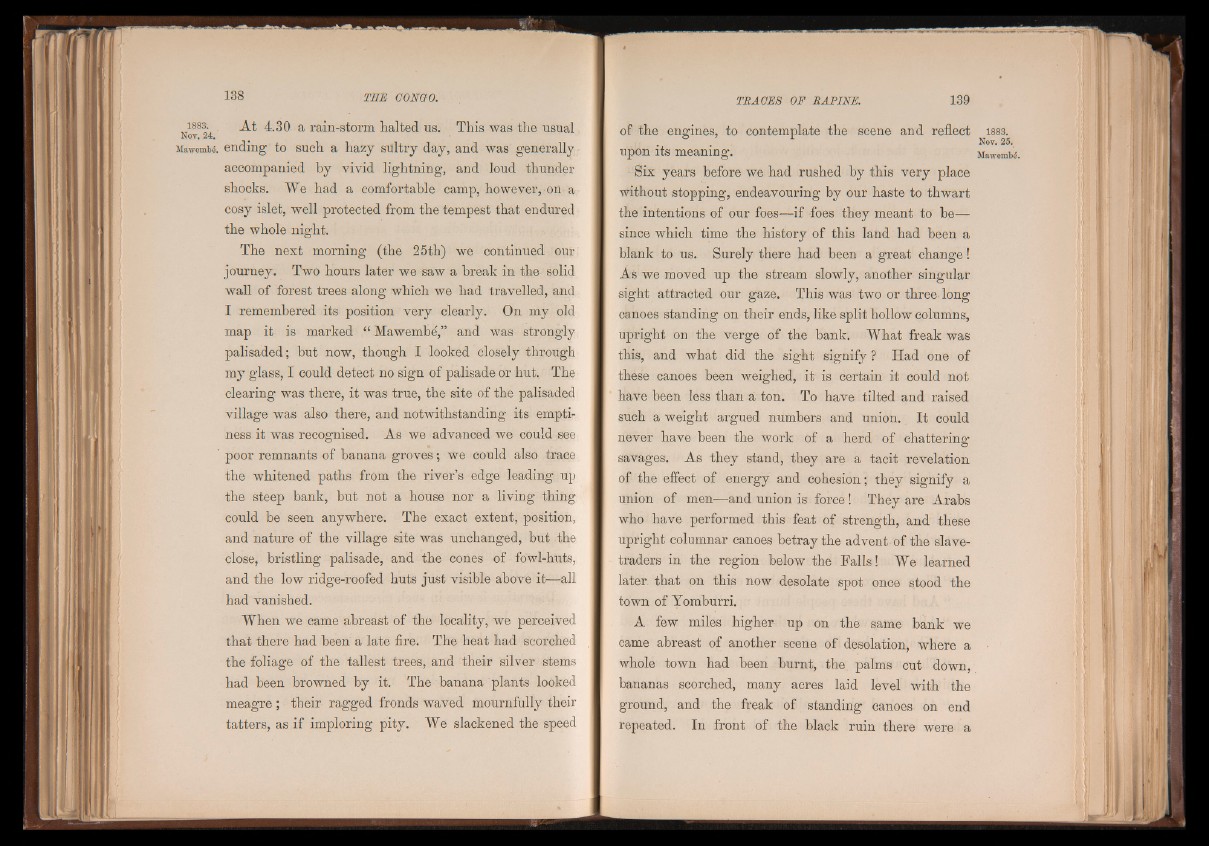
At 4.30 a rain-storm halted us. This was the usual
ending to such a hazy sultry day, and was generally
accompanied by vivid lightning, and loud thunder
shocks. We had a comfortable camp, however, on a
cosy islet, well protected from the tempest that endured
the whole night.
The next morning (the 25th) we continued our
journey. Two hours later we saw a break in the solid
wall of forest trees along which we had travelled, and
I remembered its position very clearly. On my old
map it is marked “ Mawembe,” and was strongly
palisaded ; hut now, though I looked closely through
my glass, I could detect no sign of palisade or hut. The
clearing was there, it was true, the site of the palisaded
village was also there, and notwithstanding its emptiness
it was recognised. As we advanced we could see
poor remnants of banana groves; we could also trace
the whitened paths from the river’s edge leading up
the steep bank, but not a house nor a living thing
could be seen anywhere. The exact extent, position,
and nature of the village site was unchanged, but -the
close, bristling palisade, and the cones of fowl-huts,
and the low ridge-roofed huts just visible above it—all
had vanished.
When we came abreast of the locality, we perceived
that there had been a late fire. The heat had scorched
the foliage of the tallest trees, and their silver stems
had been browned by it. The banana plants looked
meagre ; their ragged fronds waved mournfully their
tatters, as if imploring pity. We slackened the speed
of the engines, to contemplate the scene and reflect
upon its meaning.
Six years before we had rushed by this very place
without stopping, endeavouring by our haste to thwart
the intentions of our foes—if foes they meant to b e—
since which time the history of this iand had been a
blank to us. Surely there had been a great change!
As we moved up the stream slowly, another singular
sight attracted our gaze. This was two or three long
canoes standing on their ends, like split hollow columns,
upright on the verge of the bank. What freak was
this, and what did the sight signify ? Had one of
these canoes been weighed, it is certain it could not
have been less than a ton. To have tilted and raised
such a weight argued numbers and union. I t could
never have been the work of a herd of chattering
savages. As they stand, they are a tacit revelation
of the effect of energy and cohesion; they signify a
union of men—and union is force! They are Arabs
who have performed this feat of strength, and these
upright columnar canoes betray the advent of the slave-
traders in the region below the Falls! We learned
later that on this now desolate spot once stood the
town of Yomburri.
A few miles higher up on the same bank we
came abreast of another scene of desolation, where a
whole town had been burnt, the palms cut down,
bananas scorched, many acres laid level with the
ground, and the freak of standing canoes on end
repeated. In front of the black ruin there were a